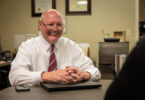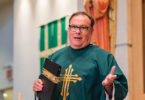
by Michael Podrebarac
Believe it or not, the Year of St. Joseph can teach us something about the sacred liturgy.
Now, everything we really know about St. Joseph comes from the handful of verses about him in the Gospels of Matthew and Luke.
But from these, we really know all we need to know: that when the time came for him to make decisions, he was obedient to God: “And when he awoke, he did as the angel had instructed him” (Mt 1:24).
Would that we would be like St. Joseph! Especially when it comes to the sacred liturgy, without which, as Pope Francis has taught, the church is absent of Christ.
You see, St. Joseph was very adept at receiving and observing what was instructed him. This obedience to divine instruction can be set apart from everything else he may have accomplished. He knew how to receive.
So, how does this relate to the sacred liturgy?
Pope Benedict XVI once noted that, ultimately, the sacred liturgy is something we “receive” rather than create.
I think Joseph would, as the patron saint of the Universal Church, agree wholeheartedly. St. Joseph’s life in the presence of Jesus and Mary was something to be received, and his principal contribution thereupon was to simply protect and provide for them.
To have humbly done as he did was the fulfillment of God’s will, and it enabled him to dwell with them in perfect harmony.
Think about this. Whenever we try to “create” an experience of God, our efforts typically end up wanting. But when we are willing to receive the experience of God, simply as given us, it all goes much better.
What greater experience of God have we than the celebration of the mysteries of our salvation as offered to us in the course of the church’s liturgical prayer?
The church provides everything needed for the liturgy, for the church herself has received from the Holy Spirit all that is necessary, and is the liturgy’s custodian, just as St. Joseph was the custodian of the Holy Family.
I’m sure this will sound a bit naive to some, especially coming from a “professional” liturgist.
But to be honest, the more I have lived with the church’s liturgical tradition these past 30 years of service, the more I have come to recognize that the truly good liturgist is the one who firstly receives, and then merely curates and prepares what has been received, so that the people of God may enter into the sacred mysteries unencumbered by distraction.
The mysteries themselves are what matter.
“And when he awoke, he did as the angel had instructed him.” We are presently engaged in returning to the full celebration of the sacred liturgy after over a year of pandemic and subsequent restrictions.
May we follow the example of St. Joseph, guardian of the church, and simply receive, once again and always thereafter, what Christ himself, through the sacraments, has lovingly offered us.
Nothing else will really work, I am convinced.






